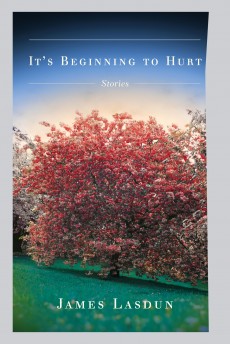 Reviewed:
Reviewed:
It’s Beginning to Hurt: Stories by James Lasdun
Farrar, Straus and Giroux, 240 pp., $23.00
If you’re curious about what the “it” stands for in the title of James Lasdun’s stately new story collection, It’s Beginning to Hurt, the answer is: pretty much everything. The characters here wait for bad news from doctors, fend off unwanted sexual advances or the machinations of seriously misguided matchmakers, suffer from FIAD (Financial-Investment Anxiety Disorder), and confront the death of neighbors, the slow disintegration of love and the sometimes unpleasant need to rely on the kindness of strangers.
In the opening story, “An Anxious Man,” which won the UK’s National Short Story competition in 2006 (Lasdun was born in the UK and has now lived in the U.S. for many years), Joseph Nagel is trying to enjoy a vacation on Cape Cod. But he can’t stop thinking about his recently built stock portfolio, and the maddening fluctuations of the market:
Whatever you did, it seemed you were bound to regret doing it, or not having done it sooner . . . It was as though some malicious higher power, having inspected the workings of the human mind had calibrated a torment for it based on precisely the instincts of desire and caution that were supposed to enable it to survive.
That’s not a bad image for Lasdun himself, who, though not quite malicious, does hover above the lives of his characters with a cosmic kind of detachment. This feeling is reinforced by his language, which is elegant and precise. In “Cleanness,” a character named Roland is preparing to attend the wedding of his septuagenarian father to a woman in her early 30s. He likes the young woman, and finds himself confiding in her about his deceased mother:
Without criticizing his father, he tried to convey his irrational but nevertheless profound belief in a secret symbiosis between his father’s vigor and his mother’s steady decline. However much the old man harangued her for not pursuing a career, for not seeing a psychiatrist when she became depressed, for drinking too much, for smoking after she was diagnosed with cancer, there was some part of him (and for this Roland admitted he had no evidence beyond his own highly subject instincts) that required absolutely that she remain on the downward slide, just as a healthy plant requires the steady disintegration of the organisms in the soil around it in order to thrive. And by whatever convoluted action of the psyche, his irreproachable concern for her welfare had precisely the opposite effect of what was apparently intended. It kept her in thrall to her own failure.
Lasdun is — with one exception, noted below — a realist, interested in the psychology of ordinary people in ordinary circumstances. He tells most of these stories in the third person, but even as he maintains an arch distance between us and his characters, his incisive style gives a sense of their dilemmas. In “Cranley Meadows,” Lev Rosenberg is a 54-year-old physics professor recently laid off in a mass faculty firing:
It was as though he had suddenly understood that along with his job at Shalehaven, the armature of his personality had been removed. In a kind of delayed collapse, like that of a building that has gone on standing for a while out of sheer habit of verticality after its beams have rotted, he had begun abruptly crumpling in upon himself.
A good litmus test for one’s appreciation of Lasdun’s talent is “Annals of the Honorary Secretary.” By all rights, it shouldn’t work at all. It begins: “It isn’t known when Lucille Thomas first appeared among us. Who brought her, or at least told her where our circle met, remains equally mysterious.” The story proceeds for a while without clearing anything up. The “circle” is some type of occult group, and Lucille’s “performances” at its meetings are legendary — why, we’re not sure; until the last two pages, when we’re given more detail about one of those performances, which sends people “push[ing] and claw[ing]” for the door. The concept is full of potential pitfalls, but Lasdun’s straight-faced tone makes his foray into the supernatural somehow even more chilling.
The collection isn’t flawless. Lasdun has a tendency to end stories on notes that are so open-ended they sound pat. (“He stood motionless, looking out into the gulf of empty space.”) When he writes about sex, his poetic sensibility can turn sappy. And he’s included a few briefer stories that read more like exercises that should have been kept in a drawer. There’s nothing particularly bad about them, but next to the more substantive entries they have the whiff of filler. The title story is barely two pages long, and reads like the sketched synopsis of a future effort. And “The Woman at the Window” reads like the unconvincing fulfillment of a creative-writing assignment: A woman leans out her window and shouts to a man on the street, saying she’s locked inside her apartment. Who is this woman? Why is she yelling to this man?
But those are quibbles. The best stories that anchor this collection are some of the strongest you’re likely to read this year.
John Williams is the editor of The Second Pass.
Books mentioned in this review:

